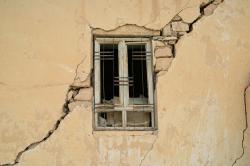Life in most of parts of California comes with the inherent risk that an earthquake can strike suddenly and without warning. You probably didn’t know that the state has more than 10,000 seismic events every year, but fortunately most of them are too small for people to even notice.
Although the entire Northwest of the United States is at high risk of earthquakes, nine of the most costly quakes in the last century occurred in California. According to the U.S. Geological Survey, there is a 70% probability that an earthquake of magnitude 6.7 or larger will strike the San Francisco Bay area over the next 30 years.
While there is not much you can do to prevent damage from an earthquake, you can still make preparations for the aftermath by: 
• Creating an earthquake preparedness list.
• Stocking a disaster kit with first-aid items, food, blankets and other necessities.
• Practicing earthquake drills (drop, cover and hold on), and
• Deciding on an emergency family meeting place.
Whether you live in San Diego or Eureka, don’t be caught off guard by the next temblor, because in California, it’s not a matter of if an earthquake strikes, but when and how large it will be.
While you can help keep your family and pets safe when the next big quake hits by following the aforementioned advice for preparing for the aftermath, how can you protect your property?
Homeowner’s insurance limitations
Homeowner’s insurance policies do not cover damage from an earthquake. Similar to flood insurance, earthquake insurance must be purchased separately in California. Without it, you’ll have to pay out of pocket to replace broken possessions and repair any damage to, or even rebuild your home.
What earthquake insurance covers
Earthquake policies respond after your home has been damaged by a quake. The policy is mainly designed to pay for reconstruction costs to repair damage or replace a home that’s been destroyed by a quake. It also covers some contents, but it typically won’t replace all of them.
Depending on the policy, it may also cover additional living expenses if you need to stay somewhere else while your home is being repaired.
The major provider of earthquake insurance in the state – the California Earthquake Authority (CEA) – provides coverage up to $200,000 for repairs and replacement of personal possessions, including furniture, musical instruments, clothing and linens, medicine and food.
The CEA policy also includes loss-of-use coverage up to $100,000, which is available without a deductible.
You can often buy endorsements – basically policy add-ons that will cover items not protected by your base earthquake policy.
For example, there is an endorsement for:
• Breakable items like glassware, crystal, china, ceramic, pottery and porcelain items, as well as figurines, glass and marble.
• Artwork – paintings, sculptures, statutes, photographs, tapestries and rugs.
• Exterior masonry veneer, like stucco and chimney facings.
Deductibles for typical policies run between 5% and 25%, depending on the issuer.
Quake insurance limitations
Earthquake insurance does not cover damage to vehicles, the land around a home or anything covered by a homeowner’s insurance policy. Any detached buildings are also typically not covered.
Uncovered losses don’t count toward the deductible. But the fact that you have, say, $100,000 in uncovered losses to your pool, fences, patio and personal effects, for instance, generally does not help satisfy the deductible.